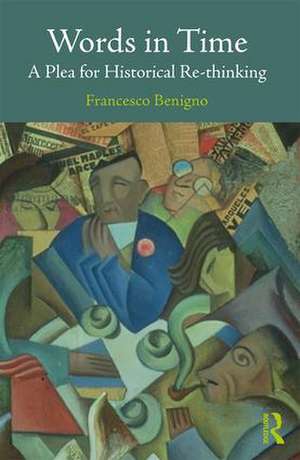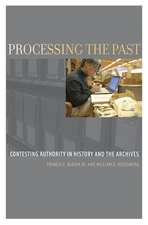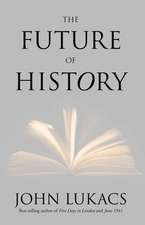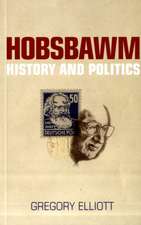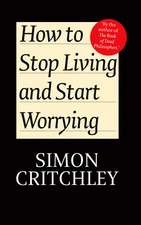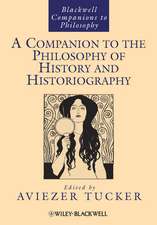Words in Time: A Plea for Historical Re-thinking
Autor Francesco Benignoen Limba Engleză Paperback – 27 apr 2017
In this volume, Francesco Benigno examines the origins and development of the words we use, critiquing the ways in which they have traditionally been employed in historical thinking and examining their potential usefulness today. Rather than being a general inventory or a specialized dictionary, this book analyses a selection of words particularly relevant not only in the idiom and jargon of the social sciences and history, but also in the discourse of ordinary people.
Exploring new trends in the historical field of reflection and representing a call for a new, more conscious, historical approach to the social world, this is valuable reading for all students of historical theory and method.
| Toate formatele și edițiile | Preț | Express |
|---|---|---|
| Paperback (1) | 363.00 lei 6-8 săpt. | |
| Taylor & Francis – 27 apr 2017 | 363.00 lei 6-8 săpt. | |
| Hardback (1) | 759.64 lei 6-8 săpt. | |
| Taylor & Francis – 27 apr 2017 | 759.64 lei 6-8 săpt. |
Preț: 363.00 lei
Nou
Puncte Express: 545
Preț estimativ în valută:
69.46€ • 72.52$ • 57.49£
69.46€ • 72.52$ • 57.49£
Carte tipărită la comandă
Livrare economică 05-19 aprilie
Preluare comenzi: 021 569.72.76
Specificații
ISBN-13: 9781138943759
ISBN-10: 1138943754
Pagini: 204
Dimensiuni: 156 x 234 x 21 mm
Greutate: 0.29 kg
Ediția:1
Editura: Taylor & Francis
Colecția Routledge
Locul publicării:Oxford, United Kingdom
ISBN-10: 1138943754
Pagini: 204
Dimensiuni: 156 x 234 x 21 mm
Greutate: 0.29 kg
Ediția:1
Editura: Taylor & Francis
Colecția Routledge
Locul publicării:Oxford, United Kingdom
Public țintă
PostgraduateCuprins
Acknowledgements
Introduction: writing history at a time of memory
0.1 The distancing of modern
0.2 The challenge of memory
0.3 Traditional history vs memorial history?
0.4 Conclusion: a plea for critical history
Part I Rethinking Early Modern Europe
Chapter 1 Violence
Rites of violence?
Different from us
Losing one’s head
Conclusions: violence as judgement
Chapter 2 Popular culture
2.1 The standard historiographical understanding of popular culture
2.2 A thousand Menocchio
2.3 The hermeneutical turn
2.4 Folklore and reflexive anthropology
2.5 Inventing the people
2.6 Conclusions: rethinking the concept of popular
Chapter 3 Public opinion
3.1 Critique as the matrix of the crisis
3.2 An utopia of communication
3.3 A deformed ancien régime
3.4 Possible pluralisms
3.5 Conclusions: counterposed rhetorics
Chapter 4 Revolutions
4.1 After the revisionisms
4.2 The mother of all revolutions
4.3 Revolutions before "the Revolution"
4.4 Conclusions: revolutions and public memory
Part II Rethinking Modernity
Chapter 5 Identity
5.1 There was once a thing called class
5.2 Between radical individualism and representations
5.3 The discovery of identity
5.4 New types of subjectivity
5.5 The modernity we have lost
5.6 The liquified world
5.7 Simul stabunt simul cadent: nation, class and identitary divisions
5.8 Conclusions: coming in terms with lost innocence
Chapter 6 Power
6.1 The time of Grand Theories
6.2 The anti-positivistic reaction
6.3 Foucault
6.4 Power in social organizations
6.5 Power, institutions, identity
6.6 Conclusions: the communicative dimension of power
Chapter 7 Generations
7.1 Wave on wave
7.2 Grounding the concept of generation
7.3 Historians and the concept of generation
7.4 Generational memory and constructing of an event
7.5 Conclusions: the generation call
Chapter 8 Terrorism
8.1 Improbable definitions and unbelievable genealogies
8.2 Revolutionary terrorism
8.3 Insurgency and counter-insurgency
8.4 The evil scourge
8.5 Conclusions: terrorism on the stage
Index
Introduction: writing history at a time of memory
0.1 The distancing of modern
0.2 The challenge of memory
0.3 Traditional history vs memorial history?
0.4 Conclusion: a plea for critical history
Part I Rethinking Early Modern Europe
Chapter 1 Violence
Rites of violence?
Different from us
Losing one’s head
Conclusions: violence as judgement
Chapter 2 Popular culture
2.1 The standard historiographical understanding of popular culture
2.2 A thousand Menocchio
2.3 The hermeneutical turn
2.4 Folklore and reflexive anthropology
2.5 Inventing the people
2.6 Conclusions: rethinking the concept of popular
Chapter 3 Public opinion
3.1 Critique as the matrix of the crisis
3.2 An utopia of communication
3.3 A deformed ancien régime
3.4 Possible pluralisms
3.5 Conclusions: counterposed rhetorics
Chapter 4 Revolutions
4.1 After the revisionisms
4.2 The mother of all revolutions
4.3 Revolutions before "the Revolution"
4.4 Conclusions: revolutions and public memory
Part II Rethinking Modernity
Chapter 5 Identity
5.1 There was once a thing called class
5.2 Between radical individualism and representations
5.3 The discovery of identity
5.4 New types of subjectivity
5.5 The modernity we have lost
5.6 The liquified world
5.7 Simul stabunt simul cadent: nation, class and identitary divisions
5.8 Conclusions: coming in terms with lost innocence
Chapter 6 Power
6.1 The time of Grand Theories
6.2 The anti-positivistic reaction
6.3 Foucault
6.4 Power in social organizations
6.5 Power, institutions, identity
6.6 Conclusions: the communicative dimension of power
Chapter 7 Generations
7.1 Wave on wave
7.2 Grounding the concept of generation
7.3 Historians and the concept of generation
7.4 Generational memory and constructing of an event
7.5 Conclusions: the generation call
Chapter 8 Terrorism
8.1 Improbable definitions and unbelievable genealogies
8.2 Revolutionary terrorism
8.3 Insurgency and counter-insurgency
8.4 The evil scourge
8.5 Conclusions: terrorism on the stage
Index
Notă biografică
Francesco Benigno is Professor of History at Teramo University, Italy, and the author of several books, including Mirrors of Revolution: Conflict and Political Identity in Early Modern Europe (Brepols, 2010).
Recenzii
"Francesco Benigno offers a panoramic overview of methodological issues in contemporary historical writing. Like many historiographers in our times, he provides a perspective on the proposition that we have crossed from a modern into a postmodern age.[...]His message seems to be that historiography, when viewed from the perspective of actual historians at work, is a dynamic process that mimics the speed of communication in our times."
-Patrick Hutton, University of Vermont, Journal of Modern History
-Patrick Hutton, University of Vermont, Journal of Modern History
Descriere
Through questions such as ‘What is power?’, ‘How are revolutions generated?’, ‘Does public opinion really exist?’ ‘What does terrorism mean?’ and ‘When are generations created?’, Words in Time scrutinises the fundamental concepts by which we confer meaning to the historical and social world and what they actually signify. This volume examines the origins and development of the words we use, critiquing the ways in which they have traditionally been employed in historical thinking and examining their potential usefulness today.
Exploring new trends in the historical field of reflection, this is valuable reading for all students of historical theory and method.
Exploring new trends in the historical field of reflection, this is valuable reading for all students of historical theory and method.
